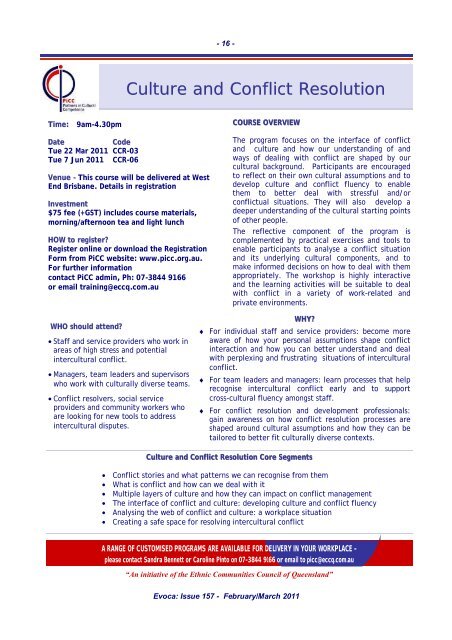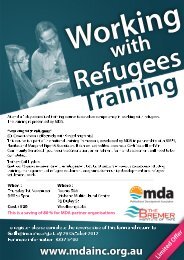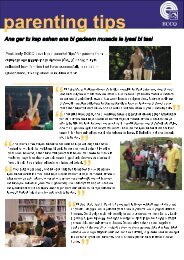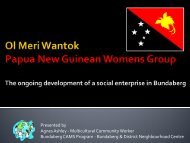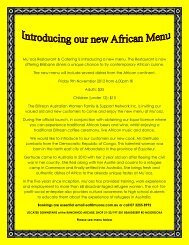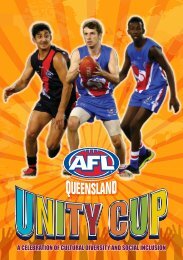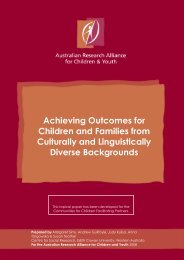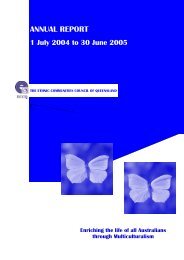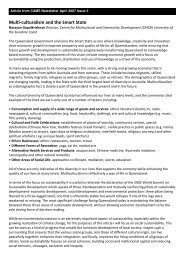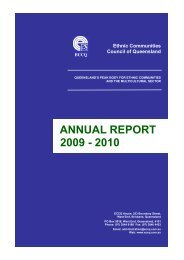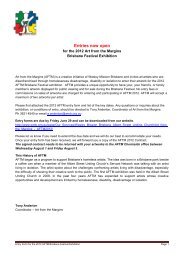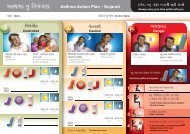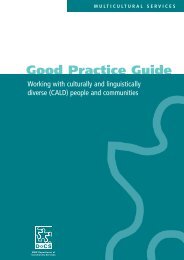EVOCA
EVOCA Issue: 157 February/March 2011 - Ethnic Communities ...
EVOCA Issue: 157 February/March 2011 - Ethnic Communities ...
You also want an ePaper? Increase the reach of your titles
YUMPU automatically turns print PDFs into web optimized ePapers that Google loves.
- 16 -<br />
Culture and Conflict Resolution<br />
Time: 9am-4.30pm<br />
Date<br />
Code<br />
Tue 22 Mar 2011 CCR-03<br />
Tue 7 Jun 2011 CCR-06<br />
Venue - This course will be delivered at West<br />
End Brisbane. Details in registration<br />
Investment<br />
$75 fee (+GST) includes course materials,<br />
morning/afternoon tea and light lunch<br />
HOW to register?<br />
Register online or download the Registration<br />
Form from PiCC website: www.picc.org.au.<br />
For further information<br />
contact PiCC admin, Ph: 07-3844 9166<br />
or email training@eccq.com.au<br />
COURSE OVERVIEW<br />
The program focuses on the interface of conflict<br />
and culture and how our understanding of and<br />
ways of dealing with conflict are shaped by our<br />
cultural background. Participants are encouraged<br />
to reflect on their own cultural assumptions and to<br />
develop culture and conflict fluency to enable<br />
them to better deal with stressful and/or<br />
conflictual situations. They will also develop a<br />
deeper understanding of the cultural starting points<br />
of other people.<br />
The reflective component of the program is<br />
complemented by practical exercises and tools to<br />
enable participants to analyse a conflict situation<br />
and its underlying cultural components, and to<br />
make informed decisions on how to deal with them<br />
appropriately. The workshop is highly interactive<br />
and the learning activities will be suitable to deal<br />
with conflict in a variety of work-related and<br />
private environments.<br />
WHO should attend?<br />
• Staff and service providers who work in<br />
areas of high stress and potential<br />
intercultural conflict.<br />
• Managers, team leaders and supervisors<br />
who work with culturally diverse teams.<br />
• Conflict resolvers, social service<br />
providers and community workers who<br />
are looking for new tools to address<br />
intercultural disputes.<br />
WHY?<br />
♦ For individual staff and service providers: become more<br />
aware of how your personal assumptions shape conflict<br />
interaction and how you can better understand and deal<br />
with perplexing and frustrating situations of intercultural<br />
conflict.<br />
♦ For team leaders and managers: learn processes that help<br />
recognise intercultural conflict early and to support<br />
cross-cultural fluency amongst staff.<br />
♦ For conflict resolution and development professionals:<br />
gain awareness on how conflict resolution processes are<br />
shaped around cultural assumptions and how they can be<br />
tailored to better fit culturally diverse contexts.<br />
Culture and Conflict Resolution Core Segments<br />
• Conflict stories and what patterns we can recognise from them<br />
• What is conflict and how can we deal with it<br />
• Multiple layers of culture and how they can impact on conflict management<br />
• The interface of conflict and culture: developing culture and conflict fluency<br />
• Analysing the web of conflict and culture: a workplace situation<br />
• Creating a safe space for resolving intercultural conflict<br />
A RANGE OF CUSTOMISED PROGRAMS ARE AVAILABLE FOR DELIVERY IN YOUR WORKPLACE -<br />
please contact Sandra Bennett or Caroline Pinto on 07-3844 9166 or email to picc@eccq.com.au<br />
“An initiative of the Ethnic Communities Council of Queensland”<br />
Evoca: Issue 157 - February/March 2011


